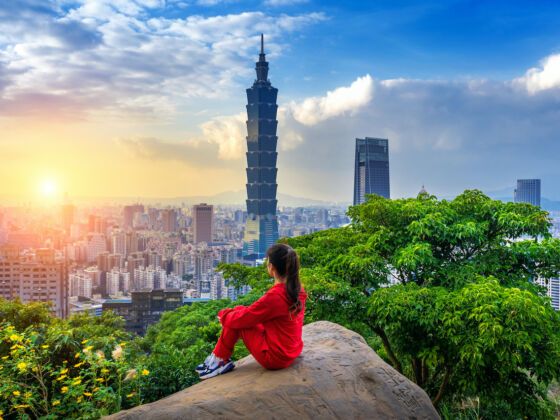Last April, I was bar-hopping around Taipei when I felt my phone buzz in my pocket. It was a push notification reporting that the United States had just logged 1 million cases of COVID-19. I locked the screen and looked around, stunned by the weight of the news and slightly guilt-ridden on behalf of my absurd privilege; there I was, surrounded by strangers, living in one of the most densely populated cities in the world, and the pandemic had barely crossed my mind all day.

Spending 2020 in Taiwan Was the Best Decision I Made This Year
During my year in Taiwan, the world turned on its head. As cases skyrocketed and my family and friends holed up in lockdown in the US, the little life I had carved out for myself in Taiwan remained largely untouched.
Even with Wuhan, the center of the pandemic back in early 2020, just a short flight away, Taiwan managed to become one of the nations least touched by COVID-19. According to the Taiwan Centers for Disease Control, as of December 21, 2020, there have been fewer than 800 confirmed cases in the country.
During the last few sessions with my Chinese tutor, she repeatedly tried to talk me out of going home. “America is so dangerous!” she would say in Mandarin. “Stay in Taiwan, it’s so much safer here.”
She had a point, but I had already promised my family that I’d be back after completing my work contract at the end of August. So, I packed my bags and flew home.
My return to the US was a shock.
The first of many red flags occurred when I landed at LAX. As I made my way through immigration and customs, not one airport employee told me to stay home for 14 days or to get tested after traveling abroad.
At that point in August, over 183,000 Americans had lost their lives to COVID-19. In Taiwan, the death count was 7. Since the spread of the new coronavirus was so much worse in the US, I’d expected that one of the busiest airports in the world would take things a bit more seriously.
Before boarding any plane heading to Taiwan, you need to get tested three days prior. Once you arrive in Taiwan, you need to present your negative test results, register your cell phone GPS with the police, then check into a quarantine hotel for 14 days. Breaking the rules will get you into some real financial trouble.
And Taiwan is not messing around when it comes to quarantine. A migrant worker from the Philippines was fined $3,500 for an eight-second quarantine violation.
It was rigorous contact tracing, widespread mask-wearing, mandatory travel quarantines, and a well-funded epidemic response program that helped keep the country safe.
Despite the small national caseload, Taiwan still embraced face masks. Even before the virus, it was considered common courtesy to wear a mask if you felt under the weather. So, when my workplace, an English cram school with hundreds of children, made them mandatory in January, no one batted an eye.
At the Taipei Lantern Festival in February, I stood among hundreds of other mask-wearing event-goers as we waited for a dance performance to begin. Before the dancers got started, the mayor of Taipei hopped on stage to remind people to dài kǒuzhào (wear a mask) and bǎohù zìjǐ yě bǎohù tārén (protect yourself and protect others). Even then, these two phrases were ubiquitous, plastered all over buses, trains, and billboards around the city.
It’s memories like these that make life in the US plain bizarre to me now. In Taiwan, I grew comfortable in a culture that deeply valued community health and mutual respect. In the US, the sight of a face mask is enough to set some teeth on edge.
Talking to Americans about my experience in Taiwan, I’m often met with suspicion or doubt. I recently mentioned to an old friend that Taiwan’s case count is practically nonexistent. They responded, “Well, that’s probably because they’re not testing, right?”
Over the past few months in the US, I’ve found myself repeatedly defending Taiwan against biases. I’ve seen people underestimate Asian healthcare systems and blame Chinese wet market culture for American deaths. (Wet markets aren’t harmful — unregulated wildlife markets are.) These arguments are often riddled with unchecked anti-Asian bias.
“It must feel good to be back in the US after a whole year in Asia, of all places” a neighbor called out as I headed out for an afternoon walk in my Southern California hometown.
“It’s great to be with family, but honestly, I wish they could’ve just joined me in Taiwan,” I replied.
I’m grateful that I managed to avoid a good chunk of this nightmare. No panic, no sudden lockdown, no ridiculous toilet paper shortage. As friends back home canceled their concert plans, I got to play gigs in crowded bars, singing and plucking my banjolele without fear of infection. As my family self-isolated, I explored new cities and wandered through busy night markets.
Soon after I returned to the US, I opened up the Sunday paper to see a massive ad that read “Taiwan Can Help.” It was a plea from Taiwan to have a place in the World Health Organization. I’ll admit, I started tearing up. China’s looming power over Taiwan has excluded the island nation from its rightful place on the global stage. Taiwan has been barred from the most powerful public health platform in the world, despite the fact that its contributions could potentially help struggling countries.
When I was applying for jobs in 2019, I had high expectations for my life in Taiwan, but I never could have predicted just how those expectations would be blown out of the water.
In 2020, I was lucky enough to reap the benefits of one of the world’s most effective COVID-19 responses. If I wasn’t already a fervid defender of Taiwan, I definitely am now.